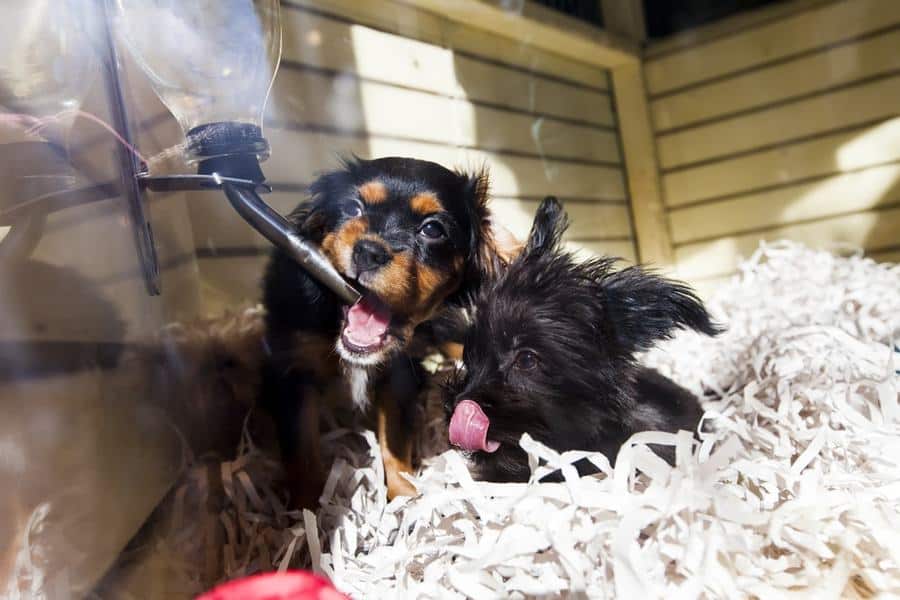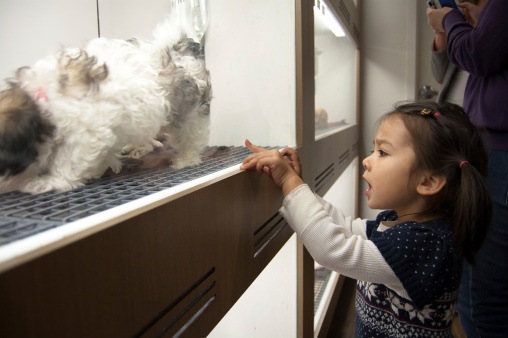“This post contains affiliate links, and I will be compensated if you make a purchase after clicking on my links.”
A multi-state Campylobacter outbreak that affected people across 13 states and resulted in 4 hospitalizations was likely spread by commercially bred (read: puppy mill) dogs sold through Petland stores nationwide.

As if you needed another reason to stop buying pet store puppies, commercially bred pups are now being implicated in a multi-state, antibiotic-resistant outbreak that hospitalized at least 4 people.
Of 30 cases reported between January and November of 2019, about 70% had direct contact with a pet store puppy. Twelve cases were linked directly to Petland, a national puppy-seller chain implicated in a previous bout of puppy-related illness involving the same kind of bacteria, campylobacter. Five of the current illnesses are Petland employees.
In January 2018, the CDC, several states, and the U.S. Department of Agriculture’s Animal and Plant Health Inspection Service (USDA-APHIS) investigated a multistate outbreak of multidrug resistant Campylobacter infections. Epidemiologic and laboratory evidence indicated that contact with puppies sold through Petland stores were a likely source of this outbreak. During the 2018 outbreak, 99% of people reported contact with a puppy in the week before illness started, and 87% reported they had contact with a puppy from Petland stores, or had contact with a person who became sick after contact with a puppy from a Petland store. Twenty-five ill people worked at Petland stores.

In a statement, Petland states that they “take the health and welfare of our employees, our customers and our pets very seriously. Since an earlier outbreak in 2016, in which no specific source of infection was identified, Petland has implemented all recommended protocols from federal and state animal and public health officials to prevent human and puppy illness, including: mandatory sanitary training for all employees, signage displayed prominently throughout the stores, multiple available sanitation stations, customer brochures describing common puppy diseases and recommendations to keep people and pets healthy, changing animal husbandry and sanitation practices to prevent transmission of Campylobacter among puppies and between puppies and people, implementing infection prevention and education protocols to help reduce illnesses among Petland employees and customers, and requesting its veterinarians implement judicious use of antimicrobial agents in puppies at Petland locations to reduce selective pressure for multidrug resistant strains of Campylobacter.
The CDC offered the following advice for pet parents and those who visit pet stores:
Puppies and dogs can carry Campylobacter, a germ that can make people sick. Follow the steps below to prevent illness.
Always wash hands thoroughly with soap and water after touching your puppy or dog, after handling their food, and after cleaning up after them.
- Adults should supervise handwashing for young children.
- If soap and water are not readily available, use hand sanitizer until you are able to wash your hands with soap and water.
- Use disposable gloves to clean up after your puppy or dog, and wash your hands afterwards. Clean up any urine (pee), feces (poop), or vomit in the house immediately. Then disinfect the area using a water and bleach solution.
- Don’t let pets lick around your mouth and face.
- Don’t let pets lick your open wound or areas with broken skin.
- Take your dog to the veterinarian regularly to keep it healthy and to help prevent the spread of disease.
Within a few days after getting a new puppy or dog, take it to the veterinarian for a health check-up.
- When choosing a pet, pick a puppy or dog that is bright, alert, and playful.
- Signs of illness include appearing lethargic (sluggish or tired), not eating, having diarrhea, and breathing abnormally. However, even a dog that appears healthy can spread germs to people and other animals.
- If your dog becomes sick or dies soon after purchase or adoption, take your dog to the veterinarian promptly and inform the pet store, breeder, or rescue organization about the pet’s illness or death. Thoroughly clean the area occupied by your pet by using a water and bleach solution.
- If your dog dies, consider waiting at least a few weeks before purchasing or adopting another pet.


















